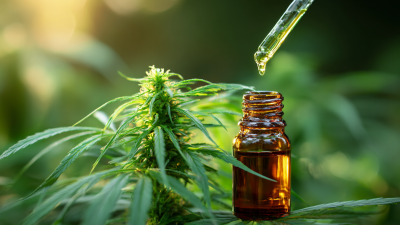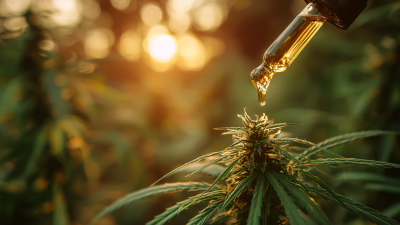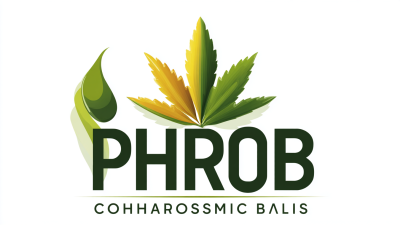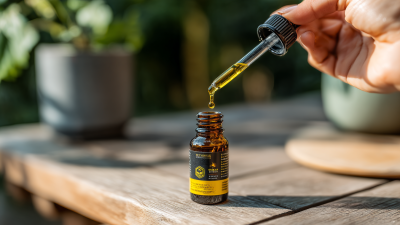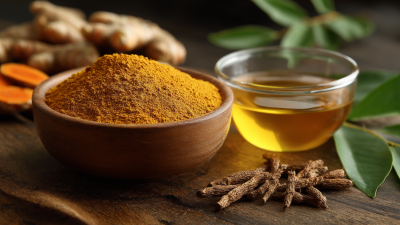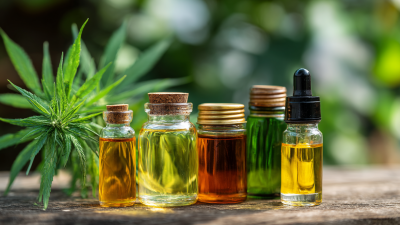As the wellness industry continues to expand and evolve, CBD derivatives are emerging as promising alternatives for various health solutions. According to a report by Grand View Research, the global CBD market is expected to reach approximately $20.3 billion by 2024, driven in part by the increasing awareness and acceptance of CBD-derived products among consumers. This growing demand has led to the exploration of diverse CBD derivatives, including full-spectrum oils, isolates, and various infused products, each offering unique benefits and applications for enhancing well-being.

As researchers and consumers alike delve into the complexities of these derivatives, understanding their potential therapeutic properties becomes essential. This blog post aims to explore the myriad of CBD derivatives, their advantages, and how they can serve as effective alternatives in the quest for improved wellness solutions.
In recent years, the wellness industry has seen a significant shift towards exploring the benefits of CBD derivatives beyond traditional oil. While CBD oil has garnered substantial attention for its therapeutic properties, a variety of alternative derivatives are now emerging, offering unique advantages for health-conscious consumers. These derivatives, including CBD capsules, gummies, topicals, and isolates, provide versatile delivery methods that cater to diverse preferences and lifestyles.

Many users find that CBD capsules and gummies offer a convenient and discreet way to incorporate wellness into their daily routines. These products not only simplify dosage but also allow for easy portability, making them ideal for busy individuals. Moreover, CBD topicals such as creams and balms enable targeted relief, appealing to those seeking localized treatment for discomfort or inflammation without the psychoactive effects associated with THC. By understanding the range of CBD derivatives available, consumers can tailor their wellness solutions to better meet their specific needs, exploring a holistic approach to health that goes beyond the traditional oil-based offerings.
The rise of cannabidiol (CBD) derivatives as wellness solutions has sparked considerable interest in the scientific community. Research indicates that CBD has various effects on the human body, primarily through its interaction with the endocannabinoid system (ECS), which plays a vital role in regulating physiological processes. According to a report by Brightfield Group, the CBD market is projected to reach $22 billion by 2022, highlighting its growing acceptance and the expansion of product derivatives such as oils, edibles, and topicals.
Recent studies have shown that different CBD derivatives can impact health in distinct ways. For instance, full-spectrum CBD contains a wider array of cannabinoids and terpenes, promoting the “entourage effect” that enhances therapeutic benefits. A study published in the *Journal of Clinical Psychology* found that full-spectrum extracts were more effective in reducing anxiety symptoms compared to CBD isolate. Moreover, CBD-infused beverages and topicals are becoming increasingly popular, with a 2021 report from Mintel indicating that 24% of consumers are likely to purchase CBD-infused drinks for relaxation and stress relief. This underscores the diverse applications of CBD derivatives in promoting holistic wellness and the need for ongoing research to fully understand their health impacts.
| CBD Derivative | Source | Health Benefits | Common Usage | Legal Status |
|---|---|---|---|---|
| Cannabidiol (CBD) | Hemp or Cannabis | Anxiety relief, anti-inflammatory | Oils, capsules | Federally legal in many countries |
| CBD Isolate | Purified hemp | Pain relief, sleep aid | Powders, edibles | Legal as a non-psychoactive compound |
| CBG (Cannabigerol) | Young cannabis plants | Anti-bacterial, neuroprotective | Oils, capsules | Legal |
| CBN (Cannabinol) | Degraded THC | Sleep aid, appetite stimulant | Oils, tinctures | Legal |
| Full-Spectrum CBD | Whole hemp plant | Entourage effect, overall wellness | Oils, topicals | Legal with less than 0.3% THC |
When it comes to exploring CBD derivatives, understanding the different forms available—oils, gummies, and topicals—is essential for finding the right wellness solution.
CBD oils and tinctures have gained popularity for their potency and versatility. They can be easily absorbed, making them an excellent option for those seeking quick relief. Recent studies indicate that CBD may help alleviate symptoms of depression, suggesting its potential as a therapeutic agent that merits further exploration.
On the other hand, CBD gummies offer a more discreet and flavorful way to consume CBD. They are particularly appealing to those who prefer a sweet treat over a traditional oil. Gummies also provide a convenient and portable option for on-the-go relief.
Meanwhile, CBD topicals, such as creams and balms, are an effective choice for addressing localized pain or skin health concerns. Recent evaluations have highlighted the best varieties available, which can significantly enhance the quality of life for users dealing with physical discomfort or skin conditions. Each form of CBD brings its unique benefits, catering to varying preferences and wellness needs.
As the wellness industry continues to evolve, consumers are increasingly turning to CBD alternatives for their health needs. The reasons behind this shift are diverse, often rooted in personal experiences and holistic approaches to well-being. Many individuals report that these alternatives provide relief from anxiety, chronic pain, and sleep disturbances without the psychoactive effects associated with traditional cannabis. This appeal has catalyzed a growing interest in various CBD derivatives, including oils, edibles, and topicals.
Consumer insights reveal a strong preference for natural remedies over pharmaceuticals, fueled by a desire for transparency and sustainability in production. Many users prioritize products that are organic, non-GMO, and third-party tested, reflecting a broader trend toward health-conscious choices. Moreover, the versatility of CBD derivatives allows for a personalized approach to wellness, enabling individuals to tailor their usage to their specific needs. As education and accessibility improve, the demand for these alternatives is likely to expand, spotlighting the importance of informed consumer choices in navigating the wellness landscape.
The landscape of health and wellness solutions is evolving rapidly, with CBD derivatives at the forefront of this change. As consumers increasingly seek natural alternatives to traditional medications, the demand for innovative CBD products has surged. Recent trends showcase a shift toward more diversified formulations, including CBD isolations, broad-spectrum extracts, and even novel derivatives like cannabigerol (CBG) and cannabinol (CBN). These innovations not only expand the therapeutic potential of CBD but also cater to the unique wellness needs of different individuals, from anxiety relief to enhanced sleep quality.

The future of CBD derivatives is brightly promising, driven by ongoing research and the regulatory landscape's gradual acceptance. As scientists explore the synergistic effects of various cannabinoids and terpenes, we may see the development of specialized products targeting specific health conditions, facilitating tailored wellness approaches. Furthermore, advancements in extraction and processing technologies are likely to yield purer and more effective derivatives, enhancing bioavailability and overall consumer experience. With a growing emphasis on sustainability, the industry is also leaning towards eco-friendly practices, ensuring that the benefits of CBD derivatives are as accessible and ethical as possible.
